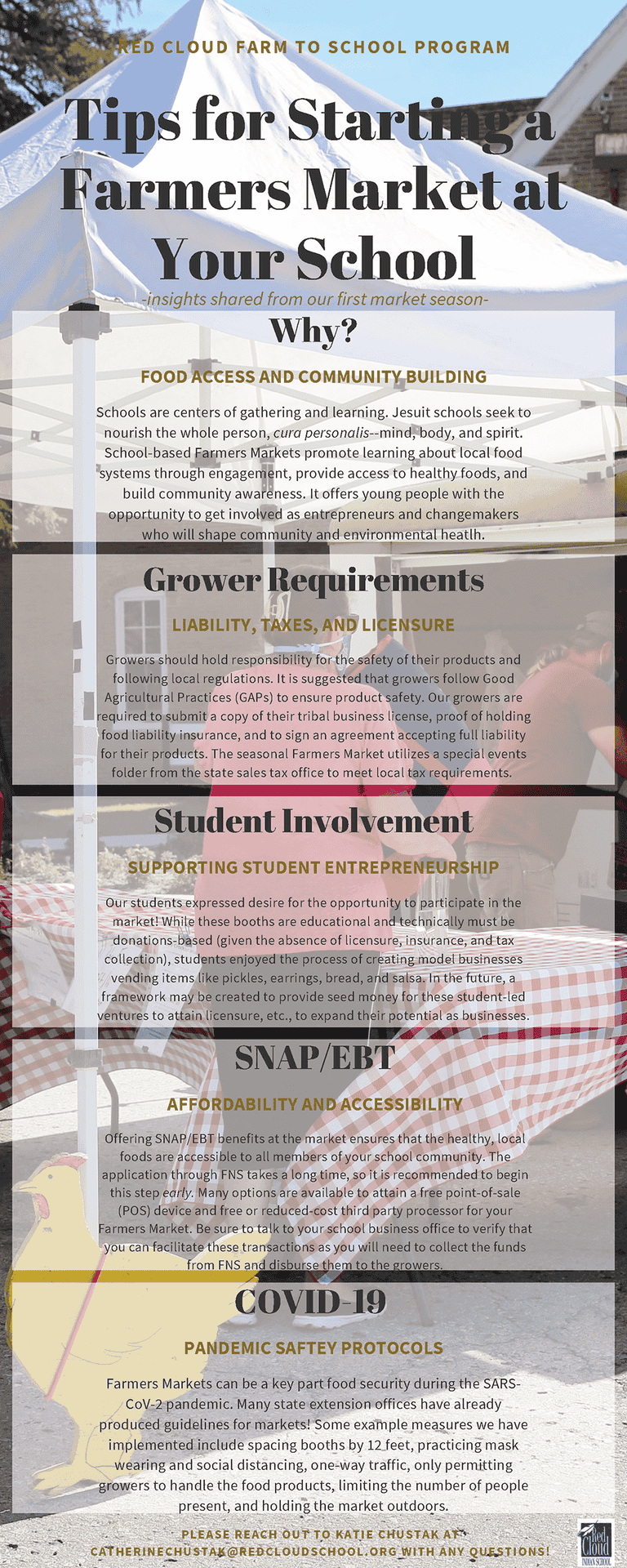This website uses cookies so that we can provide you with the best user experience possible. Cookie information is stored in your browser and performs functions such as recognising you when you return to our website and helping our team to understand which sections of the website you find most interesting and useful.
Farmers Market – Collaborating for our Common Home
Red Cloud High School (Maȟpíya Lúta Waŋkáwapȟaya Owáyawa) of the Jesuit Schools Network models how schools can collaborate with local growers in their communities while making Laudato Si practical and real for the entire community!
This year at Red Cloud we have begun hosting a weekly Farmers Market during the warm-season months. It has been a beautiful opportunity to visibly invite food systems into our community and education space. As conversations around foodshed resilience in the face of COVID-19 (in South Dakota I think of the recent Smithfield outbreak—as worker injustices were brought to light and animals euthanized and discarded—a commodified, broken food system was exposed) comingle with concern about climate change as wildfires spread in the U.S., particularly along the west coast, we find ourselves in a moment that brings unprecedented attention to the urgency of caring for our earth and building sustainable, localized food systems.
Every Friday, a combination of local producers, The Heritage Center, Red Cloud’s Farm to School Program, and emerging student entrepreneurs gather to vend products including from locally raised pork and poultry, eggs, fresh produce, traditional medicines (such as sage, bear root, and sweetgrass), and homemade favorites like salsa, pickles, and zucchini bread along a sidewalk at the school. In the midst of the pandemic, even as we have had to implement safety protocols that impart a tone of sterility, a feeling of connectedness and gratefulness arises.
In his 2015 encyclical, Laudato Sí, Pope Francis says “[n]ew forms of cooperation and community organization can be encouraged in order to defend the interests of small producers and preserve local ecosystems from destruction” (p 53.) In this sense, buying pork from a local producer or a homemade jar of pickles from a high schooler is a radical act. Though our market is small and is only a supplement to the greater local supply chain, it is a step toward a necessary future. When I see a fourth-grader pasture raising hens and selling the eggs, I have hope and am encouraged. It is a learning opportunity for young people; as we support our local producers, we also foster our generation of young people who, whether as future producers or consumers, will know how their choices and actions are in a relationship with the earth.
As a Jesuit school, we seek the nourish the minds, spirits, and bodies of our youth—cura personalis. The goal of our farm to school initiative is to connect our students with the food system and build a healthier community—the farmers market is part of that effort. The by-product of that is that we cannot be healthy while we are exploiting the earth or supporting systems of injustice—we are all related, as taught by the Lakota teaching of mitákuye oyás’iŋ. We support the development of a food system that cares for our common home and its inhabitants. These times are uncertain, but the need for action—even in little ways—is more certain than ever.
While we are only just concluding our first market season, much has been learned along the way in terms of logistics and considerations; included is a resource to help guide any schools who are also looking to set up a farmers’ market in the future.

This article was originally published in the October JSN Hemispheres.





